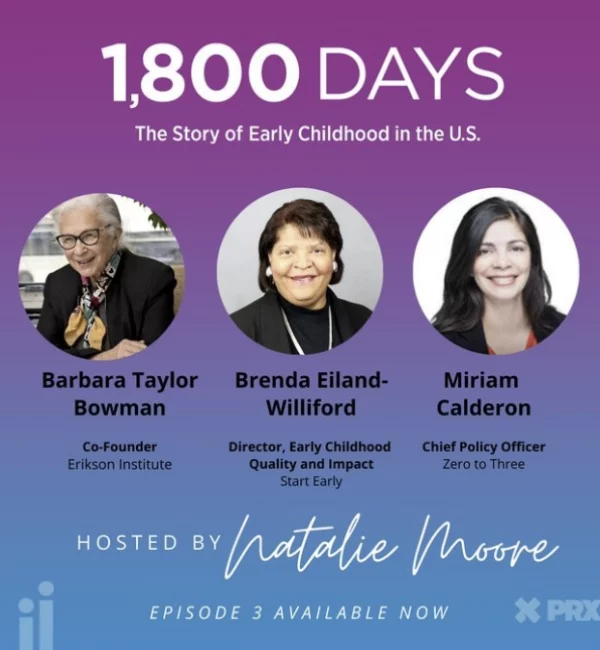Episode 3: The Growth of Head Start
Welcome to episode three of Erikson’s new podcast created by Erikson, produced by PRX, and distributed by PRX. Natalie Moore, a renowned author of The South Side and reporter for WBEZ-Chicago Public Radio, is taking us through the history of early childhood care and education, the launch of Head Start, the Preschool for All initiative, and our nation’s current patchwork system of programs, policies, and shortcomings highlighted by the pandemic.
Episode three begins with the creation of the Head Start program, a ground-breaking, national effort to provide childhood development services to children in communities with limited resources to improve their social-emotional, cognitive, and physical development.
Moore takes us back to May 1964, when President Lyndon Baines Johnson delivered what became known as his “Great Society” speech on the University of Michigan’s campus — proclaiming that through expanding government involvement in education and healthcare, he could eliminate poverty and racial injustice in America.
We hear President Johnson begin his “War on Poverty” by calling upon President John F. Kennedy’s brother-in-law, Sargent Shriver. Shiver, at the time, successfully created the Peace Corps for President Kennedy in 1961 and was a natural choice for Johnson.
As we hear the conversation between Johnson and Shriver, Shriver expresses concerns about leaving his position with the Peace Corps. However, Johnson says, “I wanna get rid of poverty,” and by August 1964, the Economic Opportunity Act passes, and Shriver is the head administrator. He quickly established Community Action Agencies and a program called Head Start that offered more services to families in an effort to redirect their trajectories.
Moore takes us through conversations with Billy Graham, Sargent Shriver, and Dr. Robert Cooke, who in 1965 designed a child development program that would serve as the blueprint for Head Start. The program created half a million new spaces for children with limited access to resources to enroll in the kindergarten prep program, but asks who would teach and care for them.
Enter Barbara Taylor Bowman, co-founder of Erikson Institute. Taylor-Bowman transports us to a dinner party where Maria Piers, a child psychologist and another co-founder of Erikson, talks to her friend, philanthropist Irving Harris, and expresses concerns about nursery school teachers. There is a need for professional education, and Piers at that time had more than 20 years of experience studying psychoanalytic thinking in children through the work of Erik Erikson, Jean Piaget, Anna Freud, and more.
By 1966, they bring on the the support of Irving Harris, Sargent Shriver, and the Johnson Administration. Piers, social worker Lorraine Wallach, and Taylor Bowman left their jobs in early childhood development to take a chance and start a new school for preschool teachers, The Chicago Institute for Early Childhood Education. Piers was the first Dean of what is now known as Erikson Institute.
By 1969 Head Start was considered successful enough to move from the Office of Economic Opportunity to the Department of Health, Education, and Welfare, a home for permanent programs.
Moore visits with Miriam Calderon, an Early Childhood Policy Advisor for the Obama and Biden Administrations who is now the Chief Policy Officer for Zero to Three, an institute advocating for the needs of infants and toddlers.
Calderon explains the public policy side of early childhood education, and gives examples of how significant world events, the development of Migrant Head Start, and breakthroughs in science have led America to see early childhood programs as a public good.
Calderon thinks that the Head Start program has been on the cutting edge in paying attention to children’s culture and language, important aspects of child development for policymakers who continue to gather data to justify more investment in young children.
Head Start has been caught between these two impulses since its beginning: helping move public perception towards viewing early childhood development as a public service and pushing the innovative ways to serve children more effectively.
Moore meets with Brenda Eiland-Williford, Director of Early Childhood Quality and Impact at Start Early. She has more than 40 years of experience and is an Erikson alum. Eiland-Williford recalls a very special student she met as a first-time Head Start teacher. Her experience with this student embodied the mission of Head Start that changed her life, and it continues to motivate her still to this day.
She saw students transform in the Head Start system and couldn’t understand the frequent criticisms by politicians on the campaign trail stating that the teachers were doing too much, and families need to take care of their children.
Next week we’ll look at how early childhood education changed in the years after Head Start was created. And you’ll hear from an expert with first-hand experience on how preschool prepares students for kindergarten: Moore’s daughter Skye.
1,800 Days: The Story of Early Childhood in the U.S. podcast is a five-episode series focused on the history of the early childhood field, most notably how the first 1,800 days of every child’s life from birth to kindergarten are the most intense period of development in every person’s lifetime.
1,800 Days was created by Erikson, produced by PRX, and distributed by PRX. Listen to episodes of 1,800 Days wherever you get your podcasts. Join the conversation on our Facebook, Twitter, and Instagram pages! For more information, visit www.erikson.edu/podcast.

Join the Erikson family with monthly news + events updates shared by academics, community members, and families.